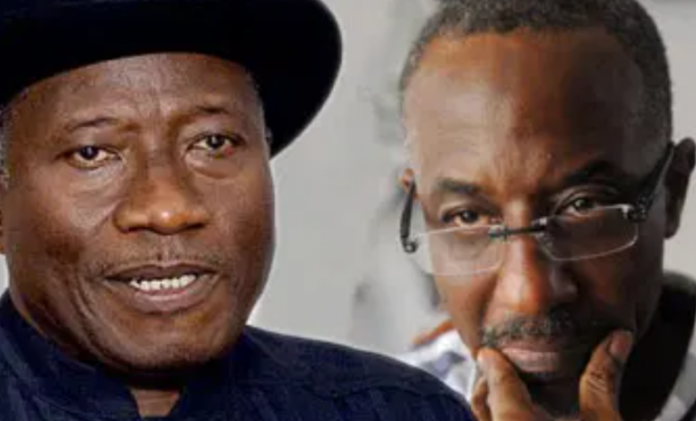
Former President Goodluck Jonathan, on Thursday, denied suspending former Central Bank Governor, Dr Sanusi Lamido Sanusi, now Emir of Kano, Muhammad Sanusi II, for alleging that $49.8bn went missing from the government’s coffers.
Jonathan, who insisted that no such money went missing, said the CBN leadership under Sanusi cooked up the allegation.
The former President spoke on Thursday in Abuja during the launch of the book, “Public Policy and Agents Interests: Perspectives from the Emerging World,” co-authored by former Minister of Finance, Dr. Shamsudeen Usman, who served as Minister of Planning under his government.
He responded to the contribution of the former CBN Governor, who claimed in the book that he was booted out of office for exposing the disappearance of the money under Jonathan’s government.
Sanusi had referred to the incident, which, he maintained, led to his dismissal as CBN governor.
In 2013, Sanusi first raised the alarm about discrepancies in oil revenue remittances, which left $49bn unaccounted for.
However, his initial figure was later revised to $20bn after discussions with the finance ministry.
The Jonathan administration quickly debunked the claims, with some sections of his government accusing Sanusi of trying to undermine the regime.
In February 2014, just months after making the allegations, President Jonathan suspended Sanusi for “financial recklessness and misconduct” as CBN Governor. However, many Nigerians believe the suspension was politically motivated and linked to his whistleblowing on the missing funds.
Sanusi became the 16th Emir of Kano, was deposed in 2020 and reinstated in 2024.
But in his opening remarks, Jonathan, who chaired the book launch, said that although he agreed with the book’s thesis and recommended it for research, he disagreed with Sanusi’s claim on the missing money.
Jonathan said Sanusi was not sacked but suspended, adding that such money would not have gone missing in Nigeria—whose budget was about $32bn at the time—without some immediate impact.
He also narrated how former German Chancellor Angela Merkel confronted him on the matter and explained that such money could not have been stolen from a struggling country and no one would know.
“Let me mention that I did not agree with some issues raised by one of the contributors. But I don’t intend to take issues because he is our royal father. And he is here.
“The one he raised that he was sacked because he blew a whistle that the Federal Government lost $49.8bn is not quite correct. He was not sacked. He was suspended because the Financial Reporting Council queried the expenditure of the CBN. And there were serious infractions that needed to be looked at. That was the reason.
“But somehow, the time was short. So, before we finished, his tenure elapsed. Probably, he would have been called back,” he explained.
The former President insisted that no such money went missing. He said Sanusi’s claims began to wobble when the figures changed from narrative from $49bn to $20bn and later $12bn.
“On the issue of $49.8bn, till today, I am not convinced that the Federal Government lost $49.8bn. And that year, our budget was $31.6bn. So, for a country that had a budget of $31.6bn to lose about $50bn and salaries were paid, nobody felt anything. The researchers that wrote this book need to do further research.
“And more so when our revered royal father came up with the figures, first $49.8bn, later $20bn and later $12bn, I don’t even know the correct one,” said Jonathan.
Jonathan explained that Price Water Coopers, which investigated the matter, revealed that no such amount was stolen but that the NNPC could not account for $1.48bn at the time.
He also noted that the then Senate Committee on Finance, chaired by Senator Ahmed Makarfi, investigated the issue and found the claims unfounded.
However, speaking later, Sanusi, who was the royal father at the event, insisted that he was “constructively dismissed” contrary to Jonathan’s claim.
“My boss, who sacked me. I was constructively dismissed. I continue to respect Jonathan and I don’t have grudges against anyone,” Sanusi said as he delivered a short message at the event he presided over as Royal Father of the Day.
The monarch also regretted what he called attempts to frustrate the Dangote Refinery.
He argued that rather than dancing to vested interests, Nigeria was supposed to be maximising the benefits of ending fuel importation with the establishment of the refinery.
“Instead of grabbing this opportunity, we are frustrating it. This is due to vested interests…People get into office and what they think is how much they can get from the state,” he said.
The Emir also revealed that the book’s chief author, Usman, lectured him at the university and praised him as one of the longest-serving public officials who had never been invited by the Economic and Financial Crimes Commission.
Thursday’s event witnessed the formal unveiling of the Shamsuddeen Usman Foundation, founded and registered by his children in his honour. The SUF is dedicated to promoting education and Artificial Intelligence in the country.








































